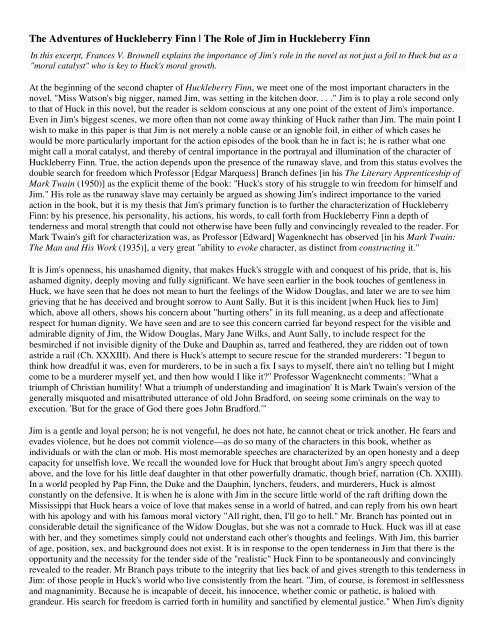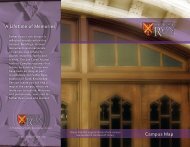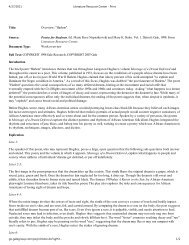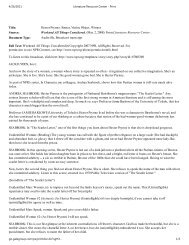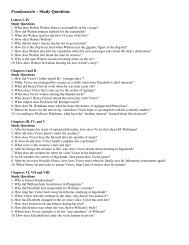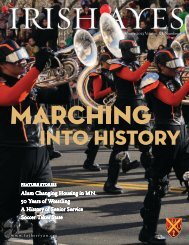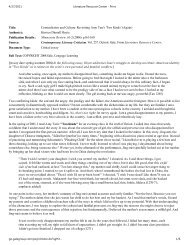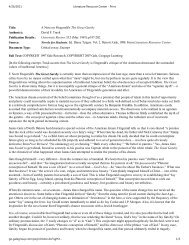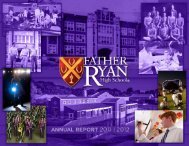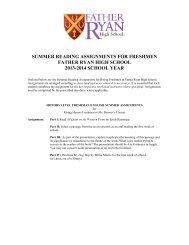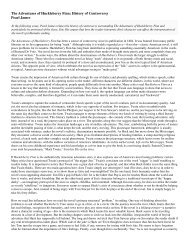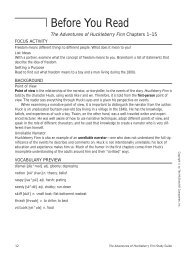The Adventures of Huckleberry Finn | The Role of Jim in Huckleberry ...
The Adventures of Huckleberry Finn | The Role of Jim in Huckleberry ...
The Adventures of Huckleberry Finn | The Role of Jim in Huckleberry ...
You also want an ePaper? Increase the reach of your titles
YUMPU automatically turns print PDFs into web optimized ePapers that Google loves.
<strong>The</strong> <strong>Adventures</strong> <strong>of</strong> <strong>Huckleberry</strong> <strong>F<strong>in</strong>n</strong> | <strong>The</strong> <strong>Role</strong> <strong>of</strong> <strong>Jim</strong> <strong>in</strong> <strong>Huckleberry</strong> <strong>F<strong>in</strong>n</strong>In this excerpt, Frances V. Brownell expla<strong>in</strong>s the importance <strong>of</strong> <strong>Jim</strong>'s role <strong>in</strong> the novel as not just a foil to Huck but as a"moral catalyst" who is key to Huck's moral growth.At the beg<strong>in</strong>n<strong>in</strong>g <strong>of</strong> the second chapter <strong>of</strong> <strong>Huckleberry</strong> <strong>F<strong>in</strong>n</strong>, we meet one <strong>of</strong> the most important characters <strong>in</strong> thenovel. "Miss Watson's big nigger, named <strong>Jim</strong>, was sett<strong>in</strong>g <strong>in</strong> the kitchen door. . . ." <strong>Jim</strong> is to play a role second onlyto that <strong>of</strong> Huck <strong>in</strong> this novel, but the reader is seldom conscious at any one po<strong>in</strong>t <strong>of</strong> the extent <strong>of</strong> <strong>Jim</strong>'s importance.Even <strong>in</strong> <strong>Jim</strong>'s biggest scenes, we more <strong>of</strong>ten than not come away th<strong>in</strong>k<strong>in</strong>g <strong>of</strong> Huck rather than <strong>Jim</strong>. <strong>The</strong> ma<strong>in</strong> po<strong>in</strong>t Iwish to make <strong>in</strong> this paper is that <strong>Jim</strong> is not merely a noble cause or an ignoble foil, <strong>in</strong> either <strong>of</strong> which cases hewould be more particularly important for the action episodes <strong>of</strong> the book than he <strong>in</strong> fact is; he is rather what onemight call a moral catalyst, and thereby <strong>of</strong> central importance <strong>in</strong> the portrayal and illum<strong>in</strong>ation <strong>of</strong> the character <strong>of</strong><strong>Huckleberry</strong> <strong>F<strong>in</strong>n</strong>. True, the action depends upon the presence <strong>of</strong> the runaway slave, and from this status evolves thedouble search for freedom which Pr<strong>of</strong>essor [Edgar Marquess] Branch def<strong>in</strong>es [<strong>in</strong> his <strong>The</strong> Literary Apprenticeship <strong>of</strong>Mark Twa<strong>in</strong> (1950)] as the explicit theme <strong>of</strong> the book: "Huck's story <strong>of</strong> his struggle to w<strong>in</strong> freedom for himself and<strong>Jim</strong>." His role as the runaway slave may certa<strong>in</strong>ly be argued as show<strong>in</strong>g <strong>Jim</strong>'s <strong>in</strong>direct importance to the variedaction <strong>in</strong> the book, but it is my thesis that <strong>Jim</strong>'s primary function is to further the characterization <strong>of</strong> <strong>Huckleberry</strong><strong>F<strong>in</strong>n</strong>: by his presence, his personality, his actions, his words, to call forth from <strong>Huckleberry</strong> <strong>F<strong>in</strong>n</strong> a depth <strong>of</strong>tenderness and moral strength that could not otherwise have been fully and conv<strong>in</strong>c<strong>in</strong>gly revealed to the reader. ForMark Twa<strong>in</strong>'s gift for characterization was, as Pr<strong>of</strong>essor [Edward] Wagenknecht has observed [<strong>in</strong> his Mark Twa<strong>in</strong>:<strong>The</strong> Man and His Work (1935)], a very great "ability to evoke character, as dist<strong>in</strong>ct from construct<strong>in</strong>g it."It is <strong>Jim</strong>'s openness, his unashamed dignity, that makes Huck's struggle with and conquest <strong>of</strong> his pride, that is, hisashamed dignity, deeply mov<strong>in</strong>g and fully significant. We have seen earlier <strong>in</strong> the book touches <strong>of</strong> gentleness <strong>in</strong>Huck, we have seen that he does not mean to hurt the feel<strong>in</strong>gs <strong>of</strong> the Widow Douglas, and later we are to see himgriev<strong>in</strong>g that he has deceived and brought sorrow to Aunt Sally. But it is this <strong>in</strong>cident [when Huck lies to <strong>Jim</strong>]which, above all others, shows his concern about "hurt<strong>in</strong>g others" <strong>in</strong> its full mean<strong>in</strong>g, as a deep and affectionaterespect for human dignity. We have seen and are to see this concern carried far beyond respect for the visible andadmirable dignity <strong>of</strong> <strong>Jim</strong>, the Widow Douglas, Mary Jane Wilks, and Aunt Sally, to <strong>in</strong>clude respect for thebesmirched if not <strong>in</strong>visible dignity <strong>of</strong> the Duke and Dauph<strong>in</strong> as, tarred and feathered, they are ridden out <strong>of</strong> townastride a rail (Ch. XXXIII). And there is Huck's attempt to secure rescue for the stranded murderers: "I begun toth<strong>in</strong>k how dreadful it was, even for murderers, to be <strong>in</strong> such a fix I says to myself, there a<strong>in</strong>'t no tell<strong>in</strong>g but I mightcome to be a murderer myself yet, and then how would I like it?" Pr<strong>of</strong>essor Wagenknecht comments: "What atriumph <strong>of</strong> Christian humility! What a triumph <strong>of</strong> understand<strong>in</strong>g and imag<strong>in</strong>ation' It is Mark Twa<strong>in</strong>'s version <strong>of</strong> thegenerally misquoted and misattributed utterance <strong>of</strong> old John Bradford, on see<strong>in</strong>g some crim<strong>in</strong>als on the way toexecution. 'But for the grace <strong>of</strong> God there goes John Bradford.'"<strong>Jim</strong> is a gentle and loyal person; he is not vengeful, he does not hate, he cannot cheat or trick another. He fears andevades violence, but he does not commit violence—as do so many <strong>of</strong> the characters <strong>in</strong> this book, whether as<strong>in</strong>dividuals or with the clan or mob. His most memorable speeches are characterized by an open honesty and a deepcapacity for unselfish love. We recall the wounded love for Huck that brought about <strong>Jim</strong>'s angry speech quotedabove, and the love for his little deaf daughter <strong>in</strong> that other powerfully dramatic, though brief, narration (Ch. XXIII).In a world peopled by Pap <strong>F<strong>in</strong>n</strong>, the Duke and the Dauph<strong>in</strong>, lynchers, feuders, and murderers, Huck is almostconstantly on the defensive. It is when he is alone with <strong>Jim</strong> <strong>in</strong> the secure little world <strong>of</strong> the raft drift<strong>in</strong>g down theMississippi that Huck hears a voice <strong>of</strong> love that makes sense <strong>in</strong> a world <strong>of</strong> hatred, and can reply from his own heartwith his apology and with his famous moral victory "All right, then, I'll go to hell." Mr. Branch has po<strong>in</strong>ted out <strong>in</strong>considerable detail the significance <strong>of</strong> the Widow Douglas, but she was not a comrade to Huck. Huck was ill at easewith her, and they sometimes simply could not understand each other's thoughts and feel<strong>in</strong>gs. With <strong>Jim</strong>, this barrier<strong>of</strong> age, position, sex, and background does not exist. It is <strong>in</strong> response to the open tenderness <strong>in</strong> <strong>Jim</strong> that there is theopportunity and the necessity for the tender side <strong>of</strong> the "realistic" Huck <strong>F<strong>in</strong>n</strong> to be spontaneously and conv<strong>in</strong>c<strong>in</strong>glyrevealed to the reader. Mr Branch pays tribute to the <strong>in</strong>tegrity that lies back <strong>of</strong> and gives strength to this tenderness <strong>in</strong><strong>Jim</strong>: <strong>of</strong> those people <strong>in</strong> Huck's world who live consistently from the heart. "<strong>Jim</strong>, <strong>of</strong> course, is foremost <strong>in</strong> selflessnessand magnanimity. Because he is <strong>in</strong>capable <strong>of</strong> deceit, his <strong>in</strong>nocence, whether comic or pathetic, is haloed withgrandeur. His search for freedom is carried forth <strong>in</strong> humility and sanctified by elemental justice." When <strong>Jim</strong>'s dignity
is violated without remorse, it is by the amoral Tom, not the moral Huck, and this will be discussed later <strong>in</strong> thispaper.<strong>Jim</strong>'s personality is strongly <strong>in</strong>fluenced by his faith <strong>in</strong> superstition, especially evil omens. His first seriousappearance <strong>in</strong> the novel, after his brief appearance as the butt <strong>of</strong> Tom's prank, is to cast a rather om<strong>in</strong>ous predictionfor Huck by means <strong>of</strong> this ox hair-ball. <strong>The</strong> reader has been prepared before this for a serious attitude on the part <strong>of</strong>the characters towards superstition, when, <strong>in</strong> the first chapter, Huck is terrified to realize that he has accidentallykilled a spider. Even the simile with which he describes the atmosphere takes on Hie morbid touch <strong>of</strong> his fear: "I setdown aga<strong>in</strong>, a-shak<strong>in</strong>g all over, and got out my pipe for a smoke; for the house was all as still as death now, and sothe widow wouldn't know." After <strong>Jim</strong> has completed his splendidly ambiguous prophecy with the dishearten<strong>in</strong>gsentence: "You wants to keep 'way firm de water as much as you k<strong>in</strong>, en don't run no resk, 'kase it's down <strong>in</strong> de billsdat you's gwyne to git hung," this chapter concludes with a one-l<strong>in</strong>e paragraph: "When I lit my candle and went up tomy room that night there sat pap—his own self" Thus enters for the first time a genu<strong>in</strong>ely evil force <strong>in</strong>to the novel, <strong>in</strong>the form <strong>of</strong> the malicious and dangerous town drunkard. Later, the wreck <strong>of</strong> the raft, which leads to the Grangerfordfeud episode, is also preceded by an evil omen: Huck carelessly handles a snake-sk<strong>in</strong>. (On this is also blamed—accurately—<strong>Jim</strong>'s rattlesnake bite and—<strong>in</strong>accurately— the near disaster on the Walter Scott.) As a f<strong>in</strong>al <strong>in</strong>stance <strong>of</strong>the direct role <strong>of</strong> superstition <strong>in</strong> the plot, there is the fact that the rescue episode would have been foiled at the start ifthe great superstitious fear <strong>of</strong> Uncle Silas had not made communication with the prisoner <strong>Jim</strong> not only possible butrelatively easy.<strong>Jim</strong> is, as Mr Branch observes, Huck's mentor <strong>in</strong> this dark and shift<strong>in</strong>g realm. But he is more than an <strong>in</strong>structor <strong>in</strong>fear, as Mr. Branch might seem to suggest; he is here aga<strong>in</strong> the voice <strong>of</strong> love and conciliation <strong>in</strong> an erraticallymalicious and quarrelsome world, although a voice touched with fear <strong>in</strong> this realm as with grief <strong>in</strong> the human realm.<strong>Jim</strong>'s only rebellion <strong>in</strong> the human realm was born <strong>of</strong> love, not hate: he planned (though futilely) to free his wife andchildren, to steal them away from their "rightful owners." Huck and <strong>Jim</strong> are essentially not rebels: they seek toescape, not to fight. <strong>The</strong>y ask only to be left alone. This is true <strong>in</strong> the human realm, and it is true as they try to ward<strong>of</strong>f "bad luck" with charms and magic formulas.We need not smile with condescension on this superstitious response to unseen malevolence. This "mythical,fatalistic level" is merely more picturesque <strong>in</strong> Huck's world than <strong>in</strong> our present world. It would be hypocritical <strong>of</strong> usto laugh at <strong>Jim</strong> and Huck's belief <strong>in</strong> the concrete existence <strong>of</strong> evil as Evil Powers, merely because the presentunwritten code observes a different form. We no longer put <strong>in</strong> our time with dead cats and salt shakers <strong>in</strong> order tosave ourselves from harm. Instead, we modern realists construct fierce, nationalistic mythologies peopled withspotless heroes and mustachioed villa<strong>in</strong>s, the roles rema<strong>in</strong><strong>in</strong>g the same, but the cast chang<strong>in</strong>g every twenty years. Sowe who have humbled ourselves before one huge fear, who accept the supremacy <strong>of</strong> Evil or Violence, and struggleto clothe ourselves most adequately <strong>in</strong> his livery, hop<strong>in</strong>g that our stockpile <strong>of</strong> A-Bombs will prove the highest <strong>in</strong> theend, laugh <strong>in</strong> relieved contempt at the multitude <strong>of</strong> little fears we no longer share. Still, even this side <strong>of</strong> a gracefuladmission <strong>of</strong> a common weakness, the reader who reads this novel responsively is eventually saturated by the aweand humility <strong>of</strong> these people (I mean especially Huck and <strong>Jim</strong>) towards what they do not understand but feel to existabove and beyond their limited power. <strong>The</strong> reader is aware <strong>of</strong> the more-than-human struggle that t<strong>in</strong>ges the novelthroughout, through all the petty and tragic human struggles. And that more-than-human struggle is most <strong>of</strong>ten madevivid through the words and actions and personality <strong>of</strong> <strong>Jim</strong>.Source Citation:Brownell, Frances V. “<strong>The</strong> <strong>Role</strong> <strong>of</strong> <strong>Jim</strong> <strong>in</strong> <strong>Huckleberry</strong> <strong>F<strong>in</strong>n</strong>.” Boston Studies <strong>in</strong> English 1: 74-83. Rpt. <strong>in</strong>Explor<strong>in</strong>g Novels. N.p.: Gale, 1998. N. pag. Discover<strong>in</strong>g Collection. Web. 29 Apr. 2010.


